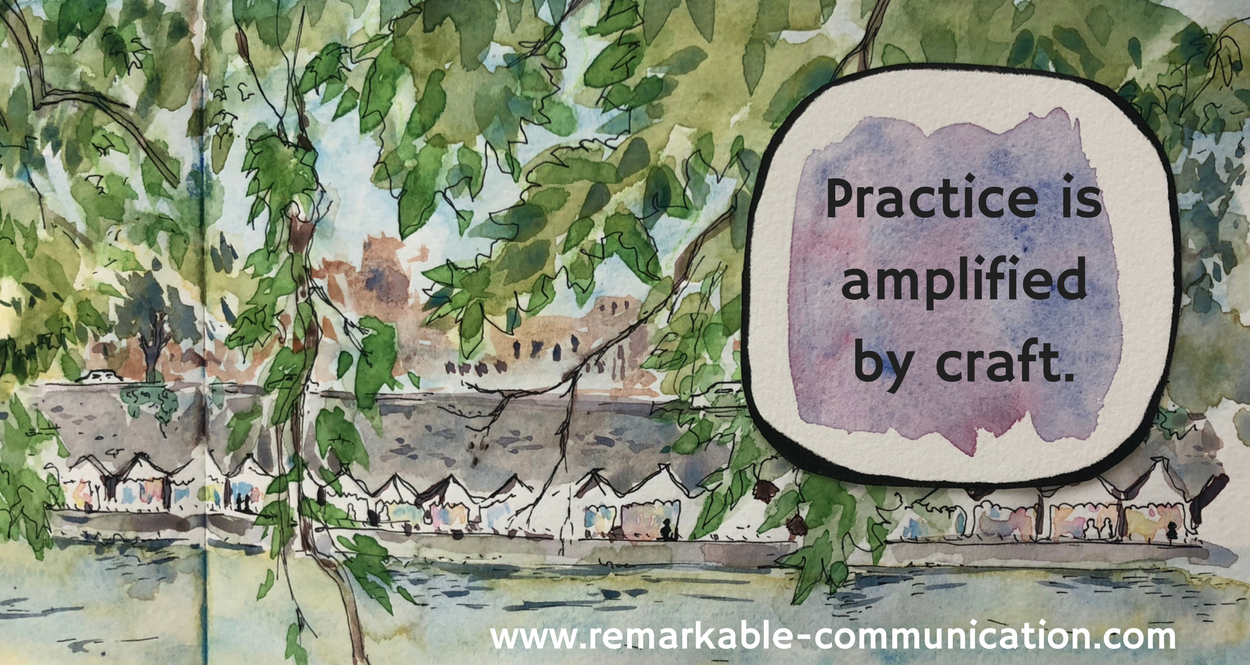
Recently I wrote about where writer’s voice comes from. I talked about that combination of experiences that leads each of us to have something unique to say.
Your voice rises up out of all of your experiences. And the more you write, the stronger your writing voice gets. It’s important to spend plenty of time just figuring yourself out, and getting those experiences into words and onto a page.
Some writers begin and end with that — they’re mostly self-taught. When it works, it’s very cool. But I know in my own journey as a writer, I’ve also benefited from studying craft.
Here are three practices that have all been critical to my own development as a writer.
#1: Getting outside of your head
Our brains are lovely — they’re where all the good stuff comes from.
Some days, they’re also where most of the limitations and hurdles come from.
It’s important to get into other people’s heads if you want to make real progress as a writer.
One of the greatest things any writer can do is to read. A lot. Widely and deeply.
I read somewhere that “writers are students of everything.” I like that. It’s one of the reasons being a writer is so interesting.
If you want to put words together, look at how other people are doing it. Great writers and ordinary people. Writers you hate and writers you adore, and maybe some writers you just don’t get.
Don’t worry too much about sounding like another writer. We all go through phases of this, and it doesn’t matter at all. You’ll discard most of the rhythms that you pick up, and the ones that stick will become part of you.
No writer’s voice is entirely self-created. Language is, by nature, collaborative. We construct our own voices from the voices we hear and the voices we read.
#2: Formal exercises
When I was in college, I took creative writing classes. And in such a class, one does exercises.
I remember one week we wrote a poem called 13 Ways of Looking at a Banana, a take on a well-known poem by Wallace Stevens.
Another week we were supposed to write a story with an ironic twist of fate. To this day I’m not sure I could craft an ironic twist of fate. But the story still turned out to be interesting, a slice of life that owed more to David Lynch than O. Henry. I’m glad I wrote it.
One important observation that came from the much-repeated “10,000 hours to mastery” idea/myth was a warning that doing the same easy exercise over and over won’t teach you much.
You could play Chopsticks for 10,000 hours without becoming a great pianist. (You’d also have an amazing tolerance for boredom.)
One of the cool thing about classes and programs is that they can get you to try different things. Different formats, different ways of approaching your work.
Some of them you won’t like at all, and some you might love.
It’s a slightly more advanced way to get out of your own head and into someone else’s.
#3: Thoughtful feedback
I believe this is the most effective tool any of us have to become better writers.
It’s also where a lot of writing classes crash and burn.
The fastest and most powerful way to get better is to present a piece of writing that we’ve given serious attention to, and have a thoughtful writer give us intelligent critique on it.
What makes for a good critique?
- Good critique understands the kind of writing you’re working on. Romance writers have a hard time getting good critique from science fiction writers.
- Good critique helps you focus on the most important things to address.
- Good critique highlights what you’re doing well, so you can work on doing more of it.
- Good critique respects your individuality, and doesn’t try to make you sound like someone else.
- Good critique is kind.
Regrettably, a lot of college writing courses, as well as critique groups, seem to have one or two of those people who love to “tear you to shreds.”
(That’s always the expression. “Tear it to shreds.” It’s invariably accompanied by the advice not to take their nastiness personally, because you have to have a thick skin to write well. You’d think these people who are theoretically so obsessed with writing quality would look for less clichéd ways to bully people.)
Now, I do think it requires some toughness to be a good writer. You have to be able to look at a sentence or a scene, or even a whole chapter, and realize that although it was a lot of work to get onto the page, it needs to go.
But I don’t think you need to be immune to nastiness or cruelty. And most of us aren’t.
The creative writing workshop I’m putting together will have an optional, but highly recommended, critique component.
All of those critiques will be done by me. Maybe some day, years in the future, I could get some help from another writer I absolutely trust. That day is not today.
You’ll have the opportunity to purchase one or two optional critiques. I’ll be looking deeply and compassionately at your content.
I’ll help you see what you do well. I’ll also help you see the most important areas of focus for you to improve. I’ll make suggestions about resources to get better. And I’ll present it in a way that’s manageable.
Also, I will be kind. Not an “idiot compassion” kindness that keeps you stagnant. But I’m not tearing anything to shreds. It’s disrespectful and unhelpful and I don’t believe in it.
If you want to know more about when the workshop opens, drop your details below! I’m aiming for early May, so it’s coming up quickly. 🙂

Leave a Reply